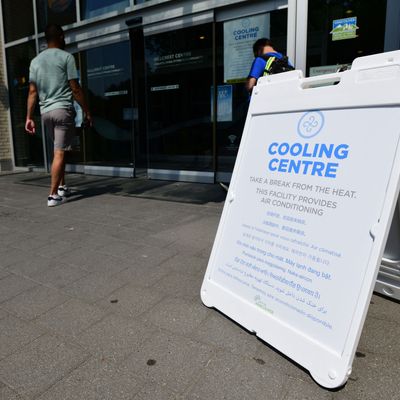
On Saturday, Portland broke its all-time high temperature of 108 degrees Fahrenheit, besting a 40-year record. The new mark would not hold: Two days later, the record was shattered again when the heat topped 116 degrees — a hotter temperature than has ever been clocked in Miami, Las Vegas, or Los Angeles. The unusual and brutal weather wasn’t just limited to Oregon’s biggest city either: 400 miles north, in the small town of Lytton, British Columbia, the thermometer spiked at 121 degrees for three days straight.
As a result of the extreme heat wave exacerbated by climate change, astonishing numbers of heat-related illnesses and excess deaths were recorded throughout the Pacific Northwest. In Portland, there have been over 500 heat-related emergency-room and urgent-care trips in less than a week, while the Oregon medical examiner’s office announced Wednesday that the temperatures caused at least 63 deaths statewide, including 45 in Multnomah County, which includes Portland. (In the Washington county that encompasses Seattle, the medical examiner’s office concluded that 13 people had died from heat-related causes.) According to the Multnomah County medical examiner, many of the victims were found alone without air conditioning. The count could still rise in the coming days: A spokesperson for the Oregon State Police warned that more bodies may be found as authorities conduct more searches and determine the cause of death in ongoing investigations.
In Canada, the temperatures have been higher and the excess deaths have been worse. The Vancouver police have reported 98 calls for sudden deaths since Friday, including 53 deaths on Tuesday alone; on an average day, police respond to three or four such calls. The excess fatalities in the normally temperate city were also consistent with the age demographics of heat-related deaths: Two-thirds of those who died were 70 or over. For the entire province of British Columbia, there have been 486 sudden deaths amid the five-day heat wave, a 195 percent increase over the usual number.
As Oregon’s state climatologist, Larry O’Neill, told Scientific American, the conditions for the heat wave can be connected directly to climate change:
The high temperatures came as the result of a high-pressure system over Oregon and Washington … One of the mechanisms for the formation of a high-pressure system is tropical cyclone activity in the western Pacific Ocean, he said. Those are the West Coast equivalent of hurricanes. And like hurricanes, they are strengthened by warmer ocean temperatures.
High-pressure systems like the one driving the Pacific Northwest heat wave is “something like three times more likely to occur when we have a tropical cyclone out in the Pacific,” [O’Neill] said. “So climate change is impacting tropical cyclone activity through modulation of sea surface temperatures, and also things like wind shear.”
And as a result of the intense heat, fire risk has surged in a region impacted by severe and extreme drought conditions — just before a Fourth of July in which industry experts anticipate record travel, outdoor recreation, and personal firework displays. (The U.S. Forest Service estimates that almost 85 percent of wildfires are man-made.) On Wednesday, Governor Kate Brown declared a state of emergency throughout Oregon, calling the threat of wildfire “imminent.” In Lytton, the British Columbia town where the temperature rose to 121 degrees, an evacuation order was put in place on Wednesday night. “It’s dire,” Mayor Jan Polderman told the CBC. “The whole town is on fire.”






























